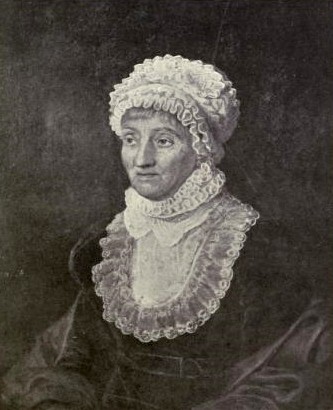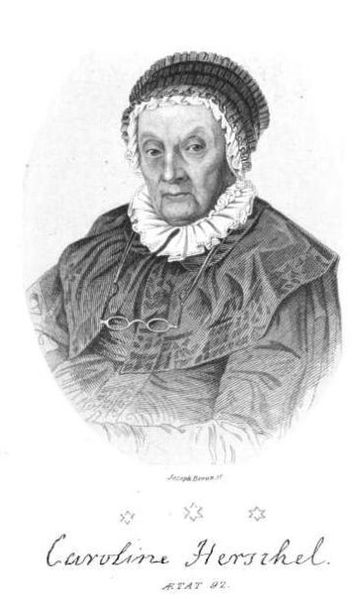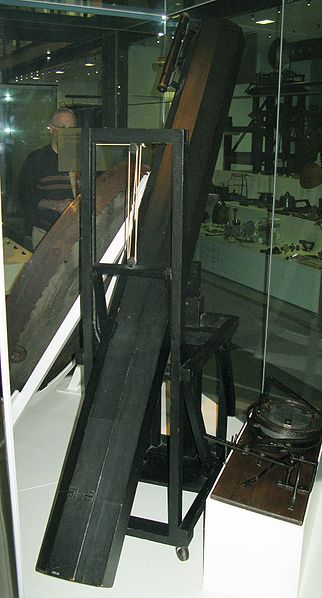<Back to Index>
- Astronomer Caroline Lucretia Herschel, 1750
- Poet Rene François Armand (Sully) Prudhomme, 1839
- Captain of the SS Josef Rudolf "Todesengel" Mengele, 1911
PAGE SPONSOR
ΕΚΛΟΓΕΣ 2012
Τυπώστε και Ψηφίστε



Caroline Lucretia Herschel (16 March 1750 – 9 January 1848) was a British astronomer, the sister of astronomer Sir Friedrich Wilhelm Herschel with whom she worked throughout both of their careers. Her most significant contribution to astronomy was the discovery of several comets and in particular the periodic comet 35P/Herschel-Rigollet, which bears her name. At the age of ten, Caroline was struck with Typhus, a bacterial disease spread by lice or fleas. This disease stunted Caroline’s growth and she never grew past four foot three. Due to this deformation, her family assumed that she would never marry and that it was best for her to remain a house servant, which her mother trained her to do until her father’s passing. Her father, Isaac, believed that she was not pretty enough to ever marry, and she never did, however she became an important collaborator for her brother and an accomplished astronomer in her own right.
Caroline was born in Hannover to Isaak Herschel and Anna Ilse Moritzen of Hannover. At the time, the crowns of England and Hannover were united under George II., meaning that all citizens of Hannover were also British citizens. Isaak led a musical family, and Wilhelm twelve years Caroline's senior, became an army oboist in his teens. After seeing combat and deciding on a new career Wilhelm decided to go to England, moving there in 1766 at the age of nineteen. Upon Isaak's death in 1767 Caroline was left working in the family kitchen, and when an invitation to join Wilhelm arrived she moved to join him in 1772.
By this point Wilhelm had established himself as an organist and music teacher at 19 New King Street, Bath, Somerset (now the Herschel Museum of Astronomy). She took several singing lessons a day from Wilhelm, who had become the choirmaster of the Octagon Chapel. Wilhelm was busy with his musical career and became fairly busy organizing public concerts. Caroline was the principal singer at his oratorio concerts, and acquired such a reputation as a vocalist that she was offered an engagement for the Birmingham festival which she declined. But it appears that Caroline did not blend in with the local society and made few friends.
Wilhelm's interest in astronomy started as a hobby to pass time at night. Caroline became as interested as Wilhelm. Wilhelm became known for his work on high performance telescopes, and Caroline found herself supporting his efforts. Caroline’s astronomy fit the central aims of the new astronomical society of London established in 1820 better than Wilhelm. Caroline possessed incredible dexterity in polishing mirrors and mounting telescopes involving astonishing discipline and dexterity which Wilhelm did not have. Therefore he depended on her support and presence. With time, Caroline learned to copy astronomical catalogues and other publications that Wilhelm had borrowed. She also learned to record, reduce, and organize her brother’s astronomical observations. She recognized that this work demanded speed and accuracy rather than understanding. However, at William’s insistence, Caroline began to make observations on her own in 1782. This insistence led to many accomplishments. Caroline no longer had to depend solely on her singing to gain satisfaction; rather she was able to contribute to society far more than she thought she would. Wilhelm was labeled an astronomer; however, Caroline Herschel was an astronomer in her own right. After taking her brother’s advice to understand astronomy, she discovered more than half a dozen comets in the 1780s and 1790s that several are named after her in some way. Throughout her writings, she repeatedly makes it clear that she desires to earn an independent wage. When this is rewarded by the state for her assistance to her brother, she becomes the first woman — at a time when even men rarely received wages for scientific enterprises — to receive a salary for services to science.
When Wilhelm married
a rich widow in 1788, it caused tension in the brother - sister
relationship. Caroline was known as a bitter, jealous woman who
worshipped her brother and resented those who invaded their domestic
lives. Therefore when he married, Caroline was always upset. Wilhelm’s
new wife made every possible effort to stay on good terms with
Caroline, but it was useless, Caroline remained bitter. This
situation also contributed to her many discoveries. In the event that
her brother became occupied with a wife, Caroline continued to work
solo on many of the astronomical projects which contributed to her rise
to fame.
William's interest in astronomy started as a hobby to pass time at night. At breakfast the next day he would give an impromptu lecture on what he had learned the night before. Caroline became as interested as William, stating that she was "much hindered in my practice by my help being continually wanted in the execution of the various astronomical contrivances." Wilhelm became known for his work on high performance telescopes, and Caroline found herself supporting his efforts.
In 1782, Wilhelm accepted the office of King's Astronomer to George III and moved to Datchet and subsequently to Observatory House near Slough (then in Buckinghamshire, now in Berkshire). The new job proved to be a mixed blessing; although it left him with ample free time to continue his astronomical observations, it also meant a reduction in income and being called upon by the king for entertainment at any time. During this time Wilhelm perfected his telescope making, building a series of ever larger devices that ultimately ended with his famous 40-foot (12 m) focal length instrument. Caroline was his constant assistant in his observations, also performing the laborious calculations with which they were connected. During one such observation run on the large telescope in 1783, Caroline became caught on an iron hook and when she was helped off "...they could not lift me without leaving nearly 2 ounces [60 g] of my flesh behind."
During her leisure hours she occupied herself with observing the sky with a 27-inch (690 mm) focal length Newtonian telescope and by this means detected a number of astronomical objects during the years 1783 - 87, including most notably an independent discovery of M110 (NGC 205), the second companion of the Andromeda Galaxy. During 1786 - 97 she also discovered eight comets, her first comet being discovered on 1 August 1786. She had unquestioned priority on five of the comets and had rediscovered Comet Encke in 1795. In 1787, she was granted an annual salary of £50 by George III for her work as Wilhelm's assistant.
In 1797 William's observations had shown that there were a great many discrepancies in the star catalogue published by John Flamsteed, which was difficult to use due to its having been published as two volumes, the catalogue proper and a volume of original observations. William realised that he needed a proper cross-index in order to properly explore these differences but was reluctant to devote time to it at the expense of his more interesting astronomical activities. He therefore recommended to Caroline that she undertake the task. The resulting Catalogue of Stars was published by the Royal Society in 1798 and contained an index of every observation of every star made by Flamsteed, a list of errata, and a list of more than 560 stars that had not been included.
Caroline returned to Hanover in 1822 following her brother's death, but did not abandon her astronomical studies, continuing to verify and confirm Wilhelm's findings and producing a catalogue of nebulae to assist her nephew John Herschel in his work. In 1828 the Royal Astronomical Society presented her with their Gold Medal for this work - no woman would be awarded it again until Vera Rubin in 1996.
In 1835, along with Mary Somerville, she was elected to honorary membership of the Royal Astronomical Society; they were the first honorary women members. In 1838 she was also elected as a member of the Royal Irish Academy. In 1846 at the age of 96, she was awarded the Gold Medal for Science by the King of Prussia.
Caroline Herschel died at Hanover on 9 January 1848. She is buried at 35 Marienstrasse in Hanover at the cemetery of the Gartengemeinde.
The asteroid 281 Lucretia (discovered 1888) was named after Caroline's second given name, and the crater C. Herschel on the Moon is named after her. Adrienne Rich's 1968 poem Planetarium celebrated Caroline Herschel's life and scientific achievements. She was also awarded a Gold medal from the Astronomical Society of London and another from the king of Prussia. The Gold medal she was awarded was due to completion of the reduction and arrangement of all the nebulae and clusters of stars observed by her brother in his sweeps. This also led the Royal Astronomical Society to elect her to become an Honorary Member which was unusual and helped Caroline become and distinct woman in society.
Caroline Herschel never did marry or have children just as her father predicted. However she did not remain a servant or a maid as her mother wanted either. Caroline gained more than any woman during her time period did. Her lack of height and beauty pushed her to a different direction so that she did not worry about marriage, but rather a sense of fulfillment which she gained in her scientific research alongside her brother and on her own. Prior to her death her health continued uninterrupted, her faculties perfect, and her memory clear. On January 9, 1848 at the age of 98, Caroline Herschel died in her hometown of Hanover. Her death was free from suffering. She lived a long fulfilling life with many achievements. An interesting fact about Caroline was that even though she had many scientific accomplishments, and was able to discover and achieve what most men were unable to in the 1800s, she lacked the knowledge of multiplication. Caroline never learned her multiplication tables because she had to learn them so late in life; therefore she always carried a table on a sheet of paper in her pocket to aid her while working.